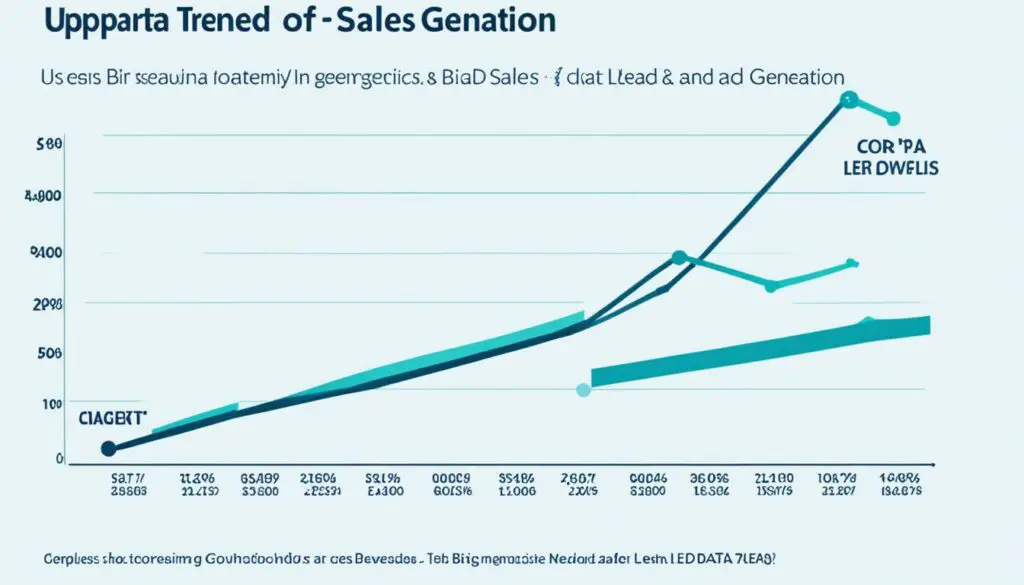Big data and artificial intelligence are revolutionizing the marketing industry, with 80% of Fortune 1000 companies increasing their investments in these technologies. Big data refers to the massive volume of structured and unstructured data that businesses collect from various sources. By leveraging advanced analytics and data-driven methodologies, marketers can gain insights into consumer behavior, preferences, and trends, leading to improved decision-making and marketing strategies.
Key Takeaways:
- Big data and AI are transforming the marketing industry.
- Big data refers to the massive volume of structured and unstructured data collected by businesses.
- Data-driven methodologies enable marketers to gain insights into consumer behavior and preferences.
- Improved decision-making and marketing strategies can be achieved through the analysis of big data.
- 80% of Fortune 1000 companies are investing in big data and AI technologies.
Understanding the Role of Big Data in Marketing
Big data plays a crucial role in shaping marketing strategies by providing marketers with invaluable insights into consumer behavior, preferences, and trends. By analyzing data from various sources such as social media, customer interactions, and marketing campaign clicks, marketers can gain a profound understanding of their target audience and make data-driven decisions that drive marketing success.
Consumer behavior analysis is a key aspect of leveraging big data in marketing. By examining data patterns and trends, marketers can uncover valuable insights into what motivates consumers, their purchasing habits, and their preferences. This knowledge allows marketers to tailor their marketing strategies to meet the specific needs and preferences of their customers, ultimately increasing the effectiveness and impact of their campaigns.
Data-driven marketing strategies are at the core of leveraging big data effectively. By leveraging the insights gained from consumer behavior analysis, marketers can develop and implement marketing strategies that are grounded in data and driven by evidence. These strategies allow marketers to target the right audience, personalize their messages, optimize their marketing budget, and maximize their return on investment. In today’s data-driven era, adopting data-driven marketing strategies is imperative for companies to stay ahead of the competition.
The Power of Consumer Behavior Analysis
Consumer behavior analysis, powered by big data, provides marketers with an in-depth understanding of their target audience. By examining data from various sources, marketers can identify patterns and trends in consumer behavior, such as purchasing preferences, brand loyalty, and response to marketing campaigns. Armed with this knowledge, marketers can develop targeted marketing strategies that resonate with their audience and drive engagement and conversions.
| Benefits of Consumer Behavior Analysis | Examples |
|---|---|
| 1. Improved targeting and segmentation | An e-commerce company analyzes customer browsing and purchase history to personalize product recommendations and offers. |
| 2. Enhanced customer experience | A retail store uses data on customer preferences and past purchases to create personalized shopping experiences both online and in-store. |
| 3. Optimized marketing campaigns | A software company analyzes customer interaction data to refine their email marketing campaigns and increase open and click-through rates. |
| 4. Better product development | An electronics manufacturer uses consumer behavior data to identify trends and develop new product features that cater to customer demands. |
Consumer behavior analysis is a powerful tool in the arsenal of data-driven marketers. By understanding their target audience at a granular level, marketers can create personalized experiences, improve customer satisfaction, and achieve marketing success.
Benefits of Big Data in Marketing
Embracing big data in marketing offers numerous benefits. Through customer segmentation using big data, marketers can consolidate data from various sources, such as CRM and customer databases. This enables them to create a holistic view of individual preferences and engagement patterns, leading to personalized marketing campaigns and improved customer engagement.
One of the key advantages of big data in marketing is the ability to conduct in-depth marketing data analysis. By leveraging advanced analytics and data-driven methodologies, marketers can gain valuable insights into market trends and consumer behavior. This empowers them to make real-time decisions, maximizing return on investment and optimizing resource allocation.
Moreover, big data provides a wealth of information for new product development. By analyzing market data and consumer preferences, companies can create innovative offerings that cater to market demands. This allows businesses to stay competitive and meet the ever-changing needs of their customers.
Overall, the advantages of big data in marketing are undeniable. From customer segmentation to marketing data analysis, leveraging big data enables marketers to make data-driven decisions, personalize campaigns, and create innovative products that drive business growth.
Examples and Use Cases of Big Data in Marketing
Big data plays a pivotal role in driving successful marketing strategies. Marketers have access to vast amounts of data that can be utilized to gain valuable insights and optimize their campaigns. Here are some examples and use cases of how big data is transforming the marketing landscape:
1. Data-Driven Marketing Campaigns
Data-driven marketing campaigns leverage big data analytics to create personalized and targeted experiences for customers. By analyzing customer interactions, preferences, and purchase history, marketers can tailor their messaging and offers to specific segments, increasing engagement and conversion rates. For example, Amazon analyzes previous purchase behavior to recommend relevant products to customers, enhancing their overall shopping experience.
2. Predictive Analytics in Marketing
Predictive analytics uses big data to anticipate future customer behavior and make informed decisions. By analyzing historical data and patterns, marketers can predict the likelihood of a customer’s next purchase, churn probability, and response to marketing campaigns. This enables them to optimize their marketing strategies and improve customer retention. Netflix, for instance, uses predictive analytics to recommend movies and TV shows based on a user’s viewing history and preferences.
3. Customer Segmentation using Big Data
Big data enables marketers to segment their customer base more effectively. By analyzing various data points such as demographics, purchase history, website behavior, and social media interactions, marketers can identify distinct customer segments with unique needs and preferences. This allows for targeted communication and personalized marketing campaigns. Coca-Cola, for example, segments its customers based on their preferences and tailors its marketing messages to resonate with each specific segment.
4. Optimizing the Customer Journey
Big data analytics helps marketers understand and optimize the customer journey. By tracking customer interactions across multiple touchpoints, marketers can identify pain points, optimize conversion funnels, and enhance the overall customer experience. This can lead to higher customer satisfaction, increased loyalty, and improved business performance. Airbnb, for instance, analyzes user behavior on its platform to identify opportunities for improvement and provide a seamless booking experience for its customers.
These are just a few examples of how big data is transforming marketing practices. By leveraging data-driven insights, marketers can make informed decisions, deliver personalized experiences, and optimize their marketing strategies for better results.
Challenges of Big Data in Marketing
While big data offers immense potential for marketing, it also presents a set of challenges that organizations need to address. Managing and harnessing the power of large volumes of data requires effective strategies and solutions to overcome the following obstacles:
Data Management and Analysis
One of the significant challenges in utilizing big data for marketing is managing and analyzing the vast amount of information available. Companies need robust data management systems and analytics tools to extract valuable insights from the data and turn them into actionable strategies. Without proper data management and analysis, businesses may struggle to make sense of the data and miss out on opportunities to optimize their marketing efforts.
Data Quality and Compliance
Ensuring data quality is another critical challenge when dealing with big data in marketing. The data collected from various sources must be accurate, reliable, and consistent to generate meaningful insights. Companies need to establish data quality standards, implement data cleansing processes, and regularly monitor data integrity to maintain the reliability of their marketing analytics. Additionally, complying with data protection and privacy regulations such as the General Data Protection Regulation (GDPR) poses further challenges, as companies must handle and store customer data securely while respecting privacy laws.
Data Integration and Alignment
Integrating and aligning data from different sources can be complex and time-consuming for marketers. As big data comes from various internal and external sources, such as customer interactions, social media, and third-party data providers, organizations must establish effective data integration strategies. Ensuring data compatibility and consistency, as well as implementing data governance practices, are essential to consolidate data into a cohesive and actionable marketing dataset.
Data Security and Privacy
Data security and privacy concerns are significant challenges in managing big data for marketing purposes. With the increase in cyber threats and data breaches, organizations must prioritize data security measures to protect customer information. Implementing robust security protocols, encryption techniques, and access controls are necessary to prevent unauthorized access and safeguard sensitive data. Additionally, ensuring compliance with privacy regulations and obtaining proper consent for data collection and processing is crucial to respect customer privacy rights.
The challenges mentioned above demonstrate that while big data brings immense opportunities for marketers, it requires careful management, strategic planning, and a commitment to data quality, compliance, integration, and security.
Impact of Big Data on Pricing Strategies
Big data analytics has revolutionized pricing strategies, enabling organizations to make data-driven decisions and optimize pricing for enhanced competitiveness and profitability. By leveraging big data, companies can differentiate pricing at a customer-product level and maximize revenue generation.
With big data analytics, businesses can analyze market trends, competitor pricing, and customer demand to gain valuable insights. This data-driven approach empowers organizations to develop pricing strategies that align with market dynamics and customer preferences.
Companies can gain a comprehensive understanding of market trends through data analysis, allowing them to adjust pricing in response to factors such as supply and demand fluctuations. By constantly analyzing and monitoring large volumes of data, businesses can identify optimal price points that maximize revenue and profit margins.
Additionally, big data analytics helps organizations identify pricing opportunities and potential areas for improvement. By analyzing competitor pricing strategies, businesses can make informed pricing decisions to stay competitive in the market. This data-driven approach enables businesses to set prices that attract customers while maintaining profitability.
In summary, big data analytics plays a crucial role in pricing strategies, allowing organizations to optimize pricing decisions based on market trends, competitor analysis, and customer demand. By leveraging data-driven pricing strategies, companies can achieve increased revenue and improved profit margins, ultimately enhancing their competitiveness in the market.
Role of Big Data in Sales and Lead Generation
Big data plays a significant role in sales and lead generation. By harnessing the power of data analytics, sales teams can optimize their strategies and improve overall performance. Here are a few key ways in which big data can enhance sales and lead generation:
Improving Sales Leads with Big Data
By analyzing customer data, sales teams can gain valuable insights into their target audience. Big data allows for a more thorough understanding of customer preferences, behavior, and pain points, enabling sales representatives to tailor their approach and engage decision-makers more effectively. With improved lead quality, sales teams can focus their efforts on prospects that are most likely to convert, ultimately leading to higher sales conversion rates.
Enhancing Targeting and Lead Generation Strategies
Big data provides a wealth of customer insights that can be utilized to refine targeting and lead generation strategies. Sales teams can identify key patterns and trends in customer behavior, enabling them to craft more personalized and compelling messages. This personalized approach helps to establish stronger connections with potential customers and increases the likelihood of conversion. By leveraging big data, sales teams can also identify new opportunities and discover untapped market segments for further expansion.
Streamlining Prospecting and Territory Planning
With big data analytics, sales teams can optimize their prospecting efforts and territory planning. By analyzing customer data and market trends, sales representatives can identify the most promising prospects and prioritize their outreach accordingly. This allows for more efficient use of time and resources, ensuring that sales representatives are focusing on the most fruitful opportunities. Territory planning can also be streamlined by leveraging location-based data, enabling sales teams to target specific regions with precision.
Overall, big data provides valuable insights that can empower sales teams to make data-driven decisions, improve lead quality, and optimize their strategies. By harnessing the power of customer insights and analytics, sales organizations can achieve higher conversion rates and drive business growth.

Big Data in Customer Relationship Management (CRM)
Customer relationship management (CRM) is an essential aspect of any business, and big data analytics is revolutionizing how organizations manage their customer relationships. By leveraging the power of big data, businesses can gain valuable insights into customer behaviors and preferences, enabling them to create personalized experiences and drive customer satisfaction.
One of the key advantages of big data in CRM is the ability to improve responsiveness. By analyzing vast amounts of customer data, businesses can quickly identify customer needs and address them in a timely manner. This allows for more efficient customer service and builds stronger relationships with customers, leading to increased loyalty and retention.
Data-driven CRM strategies also enable organizations to personalize customer experiences. By analyzing customer data, businesses can segment their customer base and deliver targeted marketing messages and tailored offers. This level of personalization not only enhances customer satisfaction but also increases the likelihood of conversions and repeat purchases.
Furthermore, big data analytics in CRM provides organizations with valuable customer insights. By analyzing customer behaviors and preferences, businesses can anticipate their needs and make proactive recommendations or offers. This not only enhances the overall customer experience but also increases the lifetime value of customers.
Here is a table highlighting the key benefits of using big data in CRM:
| Benefits of Big Data in CRM |
|---|
| Improved responsiveness to customer needs |
| Personalized customer experiences |
| Enhanced customer engagement and retention |
| Increased customer satisfaction and loyalty |
| Proactive recommendations and offers |
By harnessing the power of big data in CRM, businesses can unlock valuable insights that drive customer-centric strategies. This not only enables them to stay ahead of the competition but also fosters long-term customer loyalty and business growth.
Conclusion
Big data has revolutionized the marketing industry, enabling marketers to leverage data for marketing success. By analyzing massive volumes of structured and unstructured data, organizations can gain invaluable insights into consumer behavior, preferences, and trends. This empowers marketers to make data-driven decisions and personalize customer experiences, leading to improved customer engagement and increased revenue.
Implementing big data strategies for marketing is crucial for companies to stay competitive in the dynamic market landscape. By embracing advanced analytics and data-driven methodologies, organizations can optimize their marketing strategies and maximize business growth. The ability to consolidate customer data from various sources, such as CRM and customer databases, allows for personalized marketing campaigns tailored to individual preferences and engagement patterns.
Furthermore, leveraging big data enables real-time decision-making based on market trends and consumer behavior. This optimization of resource allocation and maximization of return on investment not only improves marketing efficiency but also drives innovation in product development. By uncovering insights from big data, companies can create innovative offerings that cater to market demands and delight customers.
FAQ
How is Big Data used in marketing?
Big Data is used in marketing to gain insights into consumer behavior, preferences, and trends. It allows marketers to make data-driven decisions and develop personalized marketing campaigns tailored to their customers’ needs and preferences.
What is the role of Big Data in marketing?
The role of Big Data in marketing is to analyze data from various sources, such as social media and customer interactions, to understand the target audience better. It enables marketers to make informed decisions, optimize marketing strategies, and improve customer engagement.
What are the benefits of using Big Data in marketing?
Leveraging Big Data in marketing offers several benefits, including customer segmentation, personalized marketing campaigns, real-time decision-making, and insights for new product development. It helps in maximizing return on investment, optimizing resource allocation, and staying competitive in the market.
Can you provide examples of Big Data in marketing?
Examples of Big Data in marketing include analyzing customer interactions to improve customer acquisition and engagement, using predictive analytics for tailored marketing strategies, and employing sentiment analysis for better customer insight. It also helps in optimizing the customer journey and building data products that delight customers.
What are the challenges of using Big Data in marketing?
The challenges of using Big Data in marketing include effectively managing and analyzing large volumes of data, ensuring data quality and compliance, and integrating data from different sources. Data security and privacy concerns also need to be addressed to protect customer information.
How does Big Data impact pricing strategies?
Big Data analytics enables organizations to differentiate pricing strategies at the customer-product level and optimize pricing decisions. By analyzing market trends, competitor pricing, and customer demand, companies can make data-driven pricing decisions that enhance competitiveness and profitability.
How does Big Data contribute to sales and lead generation?
Big Data helps improve the quality of leads by analyzing customer data, allowing sales teams to engage decision-makers effectively. It provides valuable insights into customer preferences and behavior, enabling better targeting and lead generation strategies. Additionally, it helps streamline prospecting and territory planning.
What is the role of Big Data in Customer Relationship Management (CRM)?
Big Data transforms customer relationship management by providing insights into customer behaviors and preferences. By leveraging data analytics, organizations can improve responsiveness, personalize customer experiences, and increase customer satisfaction. It helps enhance customer engagement, retention, and lifetime value.
How does leveraging Big Data benefit marketing success?
Leveraging Big Data is essential for marketing success as it enables marketers to make informed decisions, personalize customer experiences, optimize marketing strategies, and stay competitive in the dynamic market landscape. It helps drive customer engagement, increase revenue, and fuel business growth.



